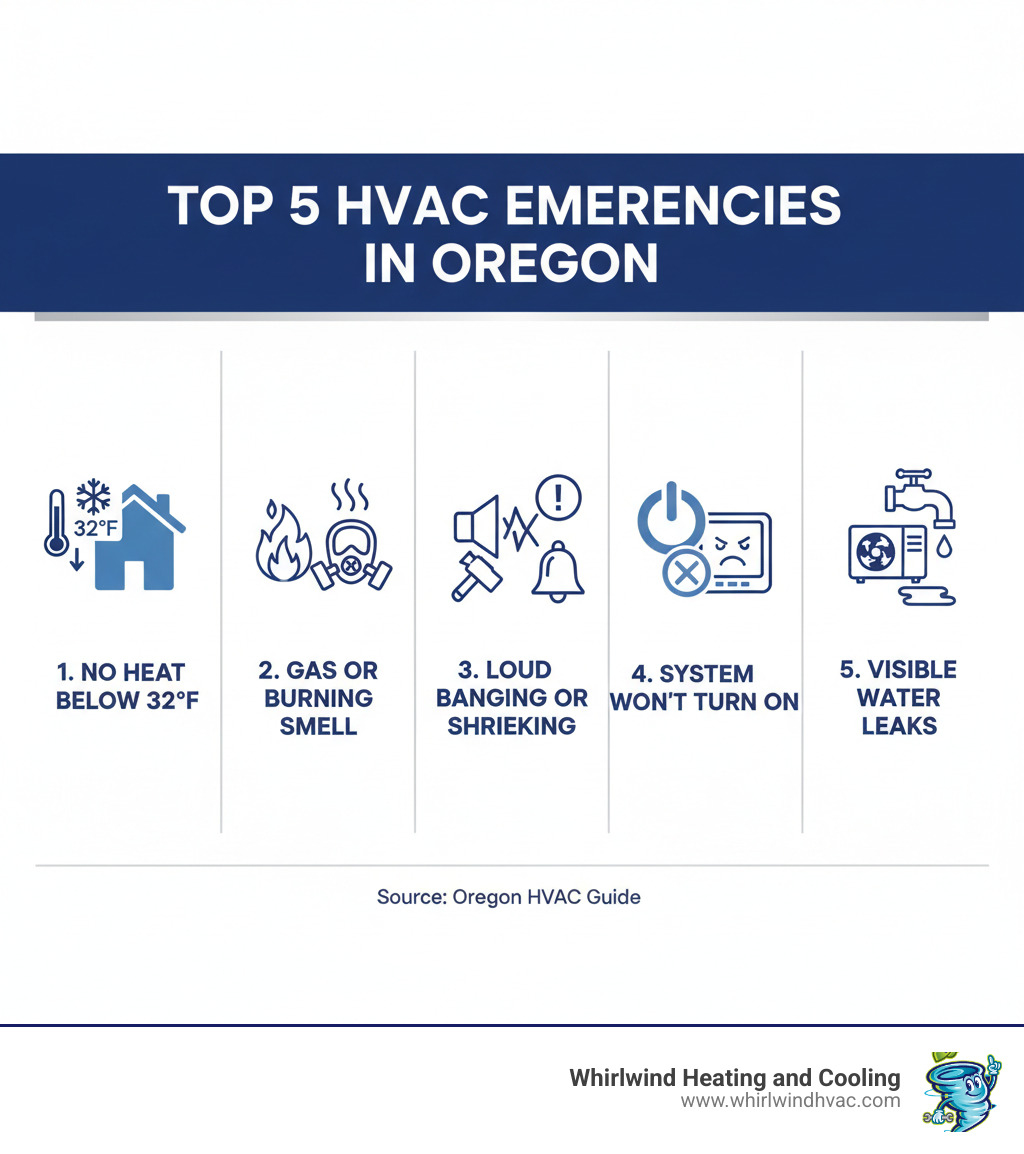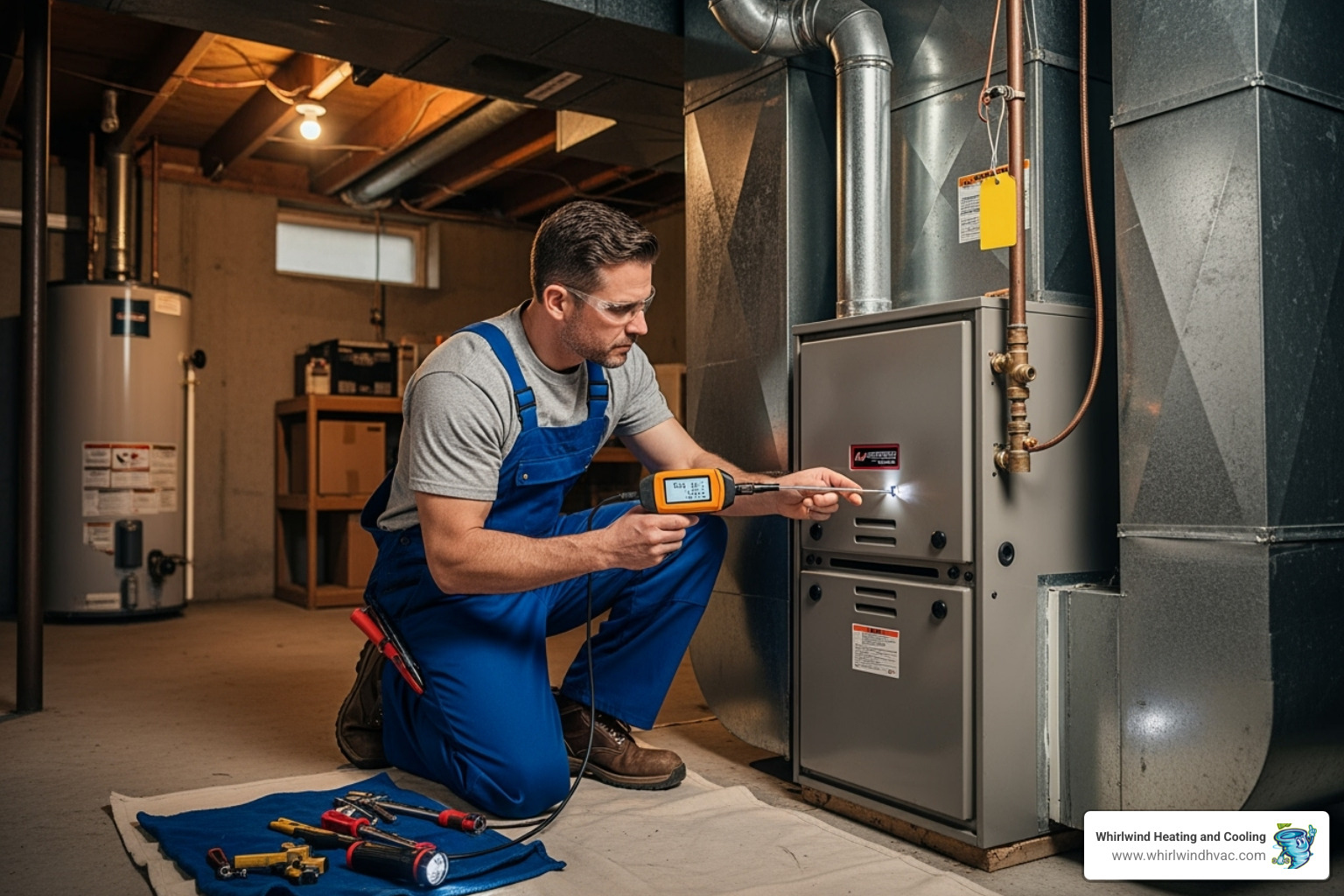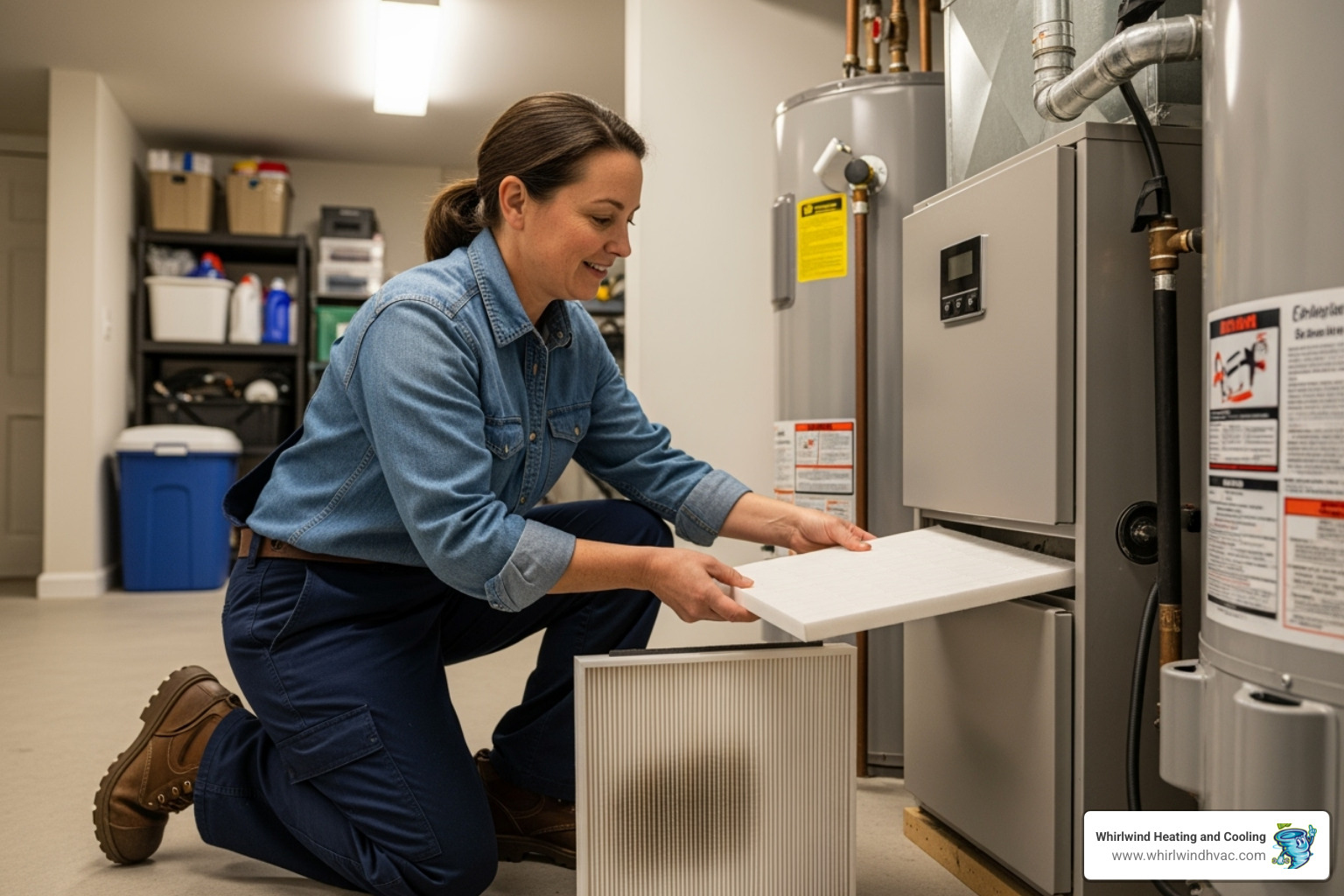When Oregon Weather Tests Your Home’s Comfort Systems
Emergency HVAC Oregon services are critical when your heating or cooling system fails unexpectedly. Whether it’s a furnace breakdown during a Pacific Northwest freeze or an AC failure during a heatwave, these situations demand immediate professional attention.
Quick Answer for Emergency HVAC in Oregon:
- 24/7 Services Available: Most Oregon HVAC companies offer round-the-clock emergency repairs.
- Common Emergencies: No heat in winter, no AC in extreme heat, gas leaks, burning smells, and loud noises.
- Response Times: Same-day service is typical, often within 2-4 hours for true emergencies.
- Coverage Areas: Portland metro, Salem, Eugene, Bend, and rural communities throughout Oregon.
- Average Costs: Emergency calls range from a $150-$400 service fee plus parts and labor.
HVAC emergencies don’t follow business hours, often striking when temperatures are at their most extreme. Oregon’s diverse climate puts unique demands on home comfort systems, making them vulnerable when you need them most.
A broken heating system in winter can lead to frozen pipes and health risks, while AC failure during a heatwave poses serious health concerns, especially for seniors and young children. This guide covers everything Oregon homeowners need to know about emergency HVAC Oregon services, from identifying true emergencies to finding reliable technicians.
What Qualifies as an HVAC Emergency?
Not every HVAC issue is an emergency, but some situations demand immediate attention to protect your family’s safety, health, or home from expensive damage. Knowing the difference between a minor inconvenience and a true crisis is key.
An HVAC emergency is any situation that threatens safety or comfort, such as a furnace failure on a freezing night or an AC breakdown during a heatwave.
Signs You Need Immediate HVAC Repair
Your system often gives warning signs before a complete failure. Call for emergency HVAC Oregon service if you notice:
- Complete system failure: The furnace or AC won’t turn on at all during extreme temperatures.
- Strange noises: Loud banging, shrieking, or grinding can signal imminent failure of critical parts like motors.
- Unusual smells: A rotten egg (gas) smell is a major emergency requiring immediate evacuation. Burning or electrical smells indicate a fire hazard.
- Electrical problems: A circuit breaker that keeps tripping is a safety feature warning you of a serious electrical fault.
- Poor or no airflow: This indicates a major blockage or a failing blower motor, leaving your home unprotected from the elements.
- Visible ice on your AC unit: Ice buildup points to refrigerant leaks or airflow problems that can destroy your compressor.
- Suspected gas or refrigerant leaks: These are hazardous to your health and require immediate professional service.
For more on these warning signs, see our guide on Signs You Need Professional HVAC Repair. Timely Heater Repair is Essential in Oregon’s climate.
Risks of Delaying Emergency Repairs
Waiting to call for help can turn a manageable problem into a catastrophe. Delaying repairs can lead to:
- Frozen pipes: A failed furnace in winter can cause pipes to burst, leading to major water damage.
- Health risks: Extreme indoor temperatures from a broken AC or furnace can cause heatstroke or worsen existing health conditions, especially for children and the elderly.
- Fire hazards: Faulty wiring or overheating components are serious fire risks that should never be ignored.
- Carbon monoxide exposure: A cracked heat exchanger can leak this deadly, odorless gas into your home.
- Escalating damage: A small problem, like a refrigerant leak, can cause a cascading failure, destroying expensive components like the compressor.
- Higher repair costs: Minor issues often become major, expensive repairs when left unaddressed.
Trust your instincts. If something feels wrong with your HVAC system, it’s safer and often cheaper in the long run to call a professional right away.
Navigating an Emergency HVAC Oregon Call
When your system fails, knowing what to expect from an emergency HVAC Oregon call can reduce stress. Most reputable companies offer 24/7 availability and same-day service for true emergencies, with response times typically between 2-4 hours.
What to Expect from an Emergency HVAC Oregon Service
Here’s a step-by-step look at a typical emergency service call:
- Initial Phone Diagnosis: We’ll ask specific questions about the symptoms to help diagnose the problem and dispatch a technician with the right parts.
- Technician Dispatch: You’ll receive an estimated arrival time. Our technicians serve the Willamette Valley, from Woodburn and Salem to Clackamas and Keizer.
- On-site System Inspection: The technician will use diagnostic tools to pinpoint the exact cause of the failure.
- Problem Explanation & Quote: You’ll get a clear explanation of the issue and upfront pricing in a written estimate before any work begins. There are no hidden fees.
- Immediate Repair: Our trucks are stocked with common parts, allowing for on-the-spot repairs for most furnaces, heat pumps, and air conditioners.
- Follow-up Recommendations: The technician may suggest maintenance or other measures to prevent future emergencies.
How to Prepare for the Technician’s Arrival
Taking a few simple steps can speed up the repair process and ensure safety:
- Clear access paths: Ensure there is a clear path to both your indoor and outdoor HVAC units.
- Secure your pets: Keep pets in a separate room for their safety and the technician’s.
- Gather system information: If possible, locate the make, model, and age of your unit.
- Document the problem: Note when the issue started and any symptoms you observed.
- Ensure an adult is present: Someone over 18 must be home to authorize repairs.
- If you smell gas or suspect an electrical issue, turn the system off. For a gas smell, evacuate the house, open windows, and call 911 and your gas company from a safe location before contacting us.
Understanding the Costs of Emergency HVAC Services
Emergency HVAC repairs are an unplanned expense, but understanding the costs can help you make informed decisions. Emergency service costs more than a scheduled appointment because you are paying for immediate, after-hours availability. In Oregon, expect an emergency service fee of $150-$400, plus the cost of parts and labor.
Factors That Influence Emergency Repair Costs
Several factors affect the final price of an emergency repair:
- Time and Day: Nights, weekends, and holidays have higher service rates due to on-call staffing.
- Complexity of the Repair: A simple fix like a thermostat replacement costs less than a major component failure, such as a cracked heat exchanger.
- Parts Required: Common parts are readily available, but specialty parts for older or unique systems may cost more.
- System Accessibility: Units in hard-to-reach areas like tight crawl spaces may require more labor time.
Can I Get a Quote for Emergency Services?
Yes. We believe in transparent, upfront pricing, especially during a stressful emergency. Here’s our process:
- Diagnostic Fee: Every emergency call includes a diagnostic fee to identify the problem. This fee is typically applied toward the total repair cost if you proceed with the work.
- Upfront Pricing: After diagnosis, our technician provides a clear, written estimate. You approve the cost before any repairs begin, so there are no surprises.
- Financing Options: We offer financing to make unexpected repairs more manageable. Don’t hesitate to ask about payment plans.
When you call for an emergency HVAC Oregon service, you’re investing in your family’s safety and peace of mind. For more information, see our HVAC Resources in Woodburn, OR.
Finding and Vetting a Reliable Oregon HVAC Technician
In an emergency HVAC Oregon situation, you need to find a trustworthy technician quickly. Taking a few moments to check for key qualifications can save you from poor workmanship and inflated bills.
Qualifications to Look for in an HVAC Technician
Look for these signs of a qualified and reliable professional:
- NATE Certification: This indicates the technician has passed rigorous, real-world exams and is highly skilled.
- Oregon CCB License: A valid license from the Construction Contractors Board is required by law and ensures the contractor meets state standards.
- Insurance and Bonding: This protects you from liability in case of accidents or property damage.
- Experience: Technicians with years of local experience in Oregon can diagnose and solve climate-specific problems more efficiently.
- Positive Customer Reviews: Check Google, Yelp, and the BBB for feedback on punctuality, fair pricing, and professionalism. Our customers consistently describe our team as “honest, professional,responsive & skilled.” Learn more at Why choose Whirlwind Heating and Cooling?
Benefits of Choosing a 24/7 Emergency HVAC Provider
An HVAC system can fail at any time. Choosing a provider with 24/7 availability offers significant advantages:
- Peace of Mind: Knowing expert help is always just a phone call away provides invaluable security.
- Immediate Response: A fast response can prevent a small issue from escalating into a catastrophic failure, saving you money.
- Damage Prevention: Quickly addressing a failing furnace can prevent frozen pipes, while a fast AC repair can protect vulnerable family members from heatstroke.
- Health and Safety: Immediate attention to gas leaks, electrical faults, or carbon monoxide risks is non-negotiable.
- True Availability: A genuine 24/7 provider is staffed to respond on nights, weekends, and holidays—not just an answering machine.
Proactive Measures to Prevent Future HVAC Emergencies
While we’re always ready to handle your emergency HVAC Oregon needs, prevention is the best strategy. A little proactive care can save you from a stressful and costly breakdown.
The Importance of Regular HVAC Maintenance
Most HVAC breakdowns are preventable. Treat your system like your car—it needs regular service to run reliably.
- Schedule Bi-Annual Tune-Ups: A spring tune-up for your AC and a fall tune-up for your heating system are essential. A technician will clean coils, check refrigerant, lubricate parts, and inspect electrical connections for safety.
- Change Air Filters Regularly: A dirty filter restricts airflow, forcing your system to work harder and increasing the risk of failure. Change filters every 1-3 months.
- Keep Outdoor Units Clear: Ensure at least two feet of clearance around your outdoor unit. Remove leaves, grass, and debris that can block airflow.
- Listen for New Noises: Grinding, banging, or squealing sounds are early warnings. Addressing them promptly can prevent a complete breakdown.
Regular maintenance extends your system’s lifespan, improves energy efficiency, and dramatically reduces the likelihood of an emergency. Explore our HVAC Repair in Woodburn, OR options for comprehensive service.
Common Systems and Seasonal Impacts in Oregon
Oregon’s variable climate puts unique stress on HVAC systems.
- Heating Systems: Prepare your Heating system before our damp, chilly winters. A pre-season tune-up for your gas or electric furnace is crucial to prevent breakdowns that could lead to frozen pipes.
- Air Conditioning: Prepare your Air Conditioning for summer. Heat waves are becoming more common, and unprepared systems often fail under the sudden strain.
- Heat Pumps & Ductless Mini-Splits: These efficient systems are popular in Oregon but require specific maintenance to handle both cold snaps and heat waves. Regular filter cleaning is key for mini-splits.
Frequently Asked Questions about Emergency HVAC in Oregon
When your HVAC system fails, you have questions. Here are answers to the most common ones we hear regarding emergency HVAC Oregon services.
What types of HVAC systems are commonly serviced during emergencies?
Our emergency technicians are equipped to service virtually any system in your Oregon home. The most common emergency calls involve:
- Furnaces (Gas and Electric): These are our most frequent calls, especially in winter. Gas furnace issues are particularly urgent due to safety concerns. See our Furnace Repair in Woodburn, OR.
- Heat Pumps: Popular for their efficiency, heat pumps work year-round and can fail in either heating or cooling mode, often by icing up. We offer expert Heat Pump Repair in Woodburn, OR.
- Central Air Conditioners: AC units often fail during the first major heatwave of the season when they are suddenly put under heavy strain. Our AC Repair in Woodburn, OR can get your home cool again.
- Ductless Mini-Splits: These systems can display confusing error codes or stop working entirely, requiring specialized knowledge to repair.
- Thermostats: A malfunctioning thermostat can cause your entire system to fail or run inefficiently.
How do Oregon’s seasonal changes impact HVAC emergencies?
Oregon’s climate puts significant stress on HVAC equipment, leading to predictable seasonal emergencies.
- Winter: Long, damp, and cold months push heating systems to their limits. Failures are common during the first deep freeze, and frozen condensate lines can shut down high-efficiency furnaces.
- Summer: Sudden heatwaves cause unprepared air conditioners to fail from the shock of high demand, leading to compressor failures and refrigerant leaks.
- Rainy Season: Debris and moisture from heavy rains can clog and damage outdoor units, causing failures in both heating and cooling seasons.
What should I do if I smell gas from my furnace?
A gas smell is a serious emergency. Follow these steps immediately and without hesitation:
- Evacuate Everyone: Get all people and pets out of the house immediately.
- Do Not Touch Electronics: Do not flip any light switches, use your phone, or unplug any appliances. A tiny spark can ignite the gas.
- Ventilate (If Possible): On your way out, open doors and windows to help air out the house.
- Call for Help from a Safe Location: Once you are safely outside and away from the home, call 911 and your gas company’s emergency line. After they have been dispatched, call us for emergency HVAC service.
Your safety is the top priority. We will coordinate with the gas company to ensure the problem is resolved safely and your furnace is repaired correctly.
Conclusion
An HVAC failure is stressful, but emergency HVAC Oregon situations are manageable when you know who to call. Recognizing true emergencies, understanding the service process, and vetting your technician are key steps to resolving the crisis quickly and effectively.
While emergencies happen, prevention is your best defense. Regular maintenance, like bi-annual tune-ups and frequent filter changes, can catch small problems before they become major failures, saving you from a middle-of-the-night breakdown.
At Whirlwind Heating and Cooling, we’ve built our reputation on being there for our customers across the Willamette Valley, from Woodburn and Salem to Portland. Our mission is to “Do it right, at a fair price,” providing quality service and honest communication, especially during a crisis.
Your family’s comfort and safety are paramount. With the right knowledge and a trusted partner, you can confidently handle any challenge Oregon’s weather throws at your home’s comfort systems.
Ready to schedule preventative maintenance or need help right now? Schedule HVAC Service with our team today for peace of mind.





